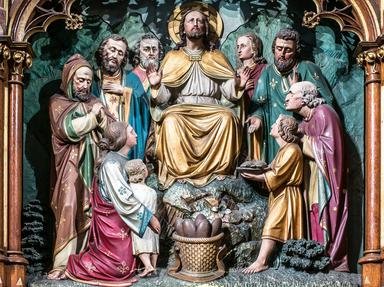Quiz Answer Key and Fun Facts
1. Follow this prophet and you will witness the prophesied destruction of Israel by the Assyrians and be reminded that those who hope in the Lord will soar on wings like eagles. Which prophet indicated the coming Messiah would be an heir to the throne of David?
2. Which woman, best known for rescuing her brother, performed the duties of a prophetess for the people of Israel?
3. Joel was a prophet whose message was about 'the Day of the Lord' (aka judgement day). In a swarm of what insect does Joel see the darkness and suffering that will characterise that day?
4. Amos, a shepherd and dresser of figs sent to the northern kingdom of Israel, denounced the setting up of a creature of worship in what image by Jeroboam?
5. Elijah was one of the most notable Old Testament prophets, doing amazing feats to authenticate his ministry. Follow him at his journey's end, and you will notice Elisha pick up what item belonging to Elijah, after seeing Elijah caught up to heaven in a whirlwind?
6. Follow the prophet Malachi to reveal the unchanging message of God - a reassurance of his constant and continuing love - but what does the name 'Malachi' mean?
7. The prophet Micah provides clear directions to follow: "Act justly, love mercy and what else"?
8. Follow the prophet Huldah, whose advice Josiah sought for clarification of what was written in the Book of the Law (2 Kings 22:8-20), and you'll discover she was a contemporary of Zephaniah and what weeping prophet?
9. Follow the prophet Zephaniah and you will hear him prophesy against those who are complacent and who think, 'The Lord will do nothing, either good or bad' (1:12), reminiscent of which lukewarm church judged in the book of Revelation?
10. We follow the prophet Ezekiel to a place where the spiritually dead are restored to life. Over what valley are we looking?
11. Follow this prophet to his eventual destination, Nineveh, and you'll see yet another imperfect and weak man that God chose to use to proclaim his message. Which reluctant prophet's journey ended in the repentance of the Assyrian people?
12. Which prophet interpreted the writing on the wall, 'MENE, MENE, TEKEL, PARSIN'?
13. Which prophet would you have to follow to hear a message to the returned exiles in Judah and Jerusalem telling them to get their priorities right and rebuild the temple?
14. To talk to her, which prophetess had to be followed to a palm tree that bore her name, located between Ramah and Bethel in the hill country of Ephraim?
15. Follow the prophet Jeremiah from his hometown north of Jerusalem, Anathoth, to the time where the Babylonians destroyed the city of Jerusalem and you will witness the people of Judah (where he was living) flee to what southern country, taking Jeremiah with them?
Source: Author
VegemiteKid
This quiz was reviewed by FunTrivia editor
agony before going online.
Any errors found in FunTrivia content are routinely corrected through our feedback system.

